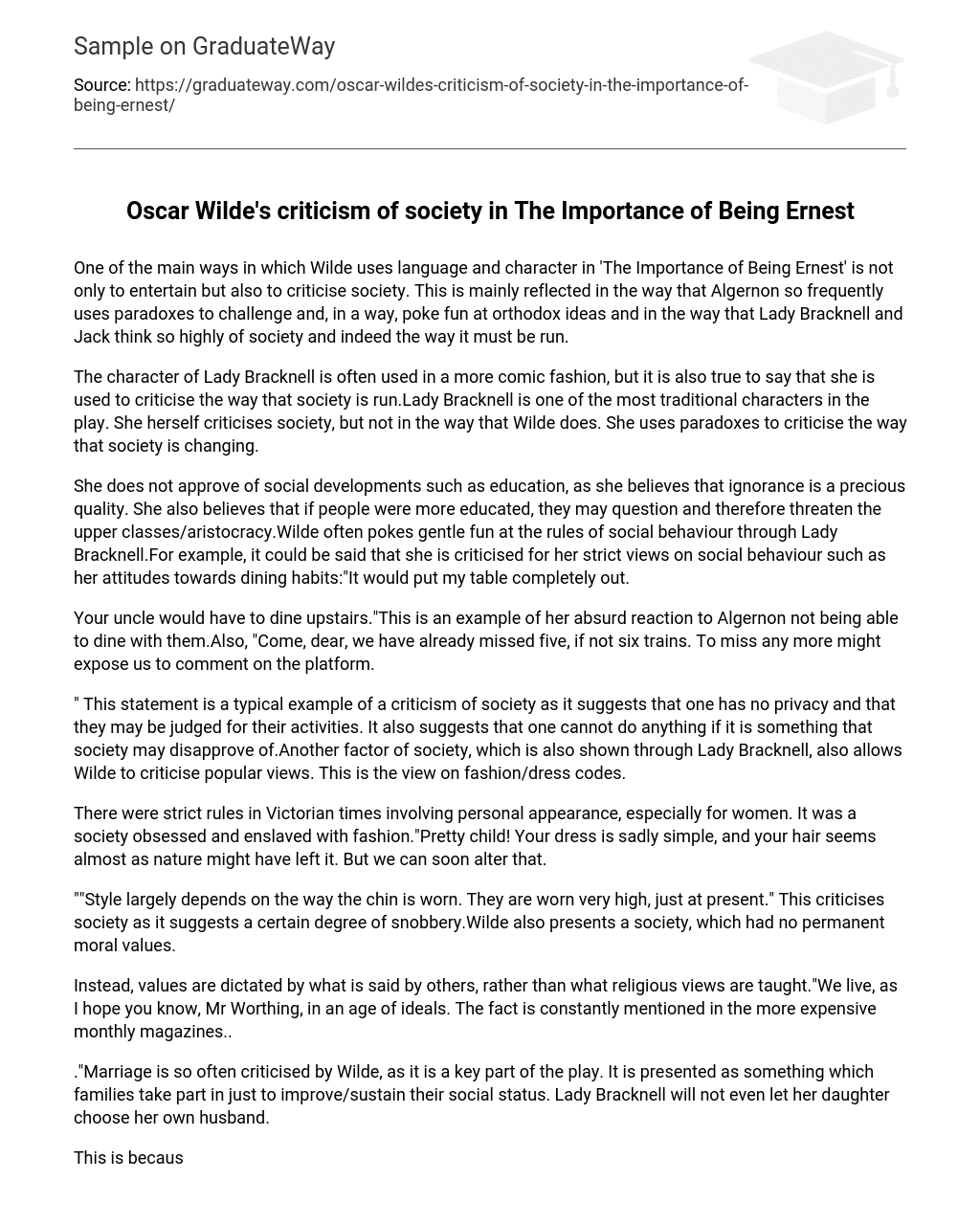Wilde employs language and character in ‘The Importance of Being Ernest’ to both entertain and critique society. This is evident through Algernon’s frequent use of paradoxes to challenge orthodox ideas and humorously poke at them. Additionally, Lady Bracknell and Jack’s high regard for society and their beliefs about how it should be governed further highlight Wilde’s criticism.
Lady Bracknell, a character often portrayed comically, serves as a critique of societal norms. In the play, she represents tradition and voices her criticism of society, albeit in a different manner than Wilde. Utilizing paradoxes, she highlights the changing nature of society and its shortcomings.
Lady Bracknell, a character in Wilde’s works, holds an unfavorable stance towards societal advancements, including education, considering ignorance to be esteemed. Furthermore, she perceives increased education as a potential catalyst for questioning and destabilizing the upper classes. Wilde cleverly satirizes social norms through Lady Bracknell’s rigid perspectives, particularly towards dining etiquette: “It would put my table completely out.”
This is an example of her absurd reaction to Algernon not being able to dine with them. Your uncle would have to dine upstairs. Also, “Come, dear, we have already missed five, if not six trains. To miss any more might expose us to comment on the platform.
“This statement is a typical example of a criticism of society as it suggests that one has no privacy and that they may be judged for their activities. It also suggests that one cannot do anything if it is something that society may disapprove of. Another factor of society, which is also shown through Lady Bracknell, also allows Wilde to criticise popular views. This is the view on fashion/dress codes.”
In Victorian times, personal appearance, particularly for women, was governed by strict rules. This society was fixated on fashion and held captive by it. “Oh, what a lovely child! Your dress is so plain, and your hair appears to be untouched by any styling. But don’t worry, we can easily fix that.
“Style greatly relies on the manner in which the chin is carried. At the moment, they are carried exceedingly elevated.” This critique implies a level of snobbery within society. Wilde also depicts a society devoid of enduring moral principles.
Instead of being influenced by religious teachings, values are determined by the opinions of others. “We currently live in a time where ideals hold great significance, as you may be aware, Mr. Worthing,” as repeatedly emphasized in higher-end publications.
Marriage is frequently criticized by Wilde in his play, as it is portrayed as a crucial component. Families engage in it solely to enhance or maintain their social standing. Even Lady Bracknell denies her daughter the freedom to select her own spouse.
This is because the engagement is meant to be decided by the parents. According to Wilde, an engagement should be a surprise for a young girl, whether pleasant or unpleasant. It is not something she should be able to arrange for herself. Wilde’s use of Jack and Lady Bracknell as characters serves to criticize society in a similar manner.
Nevertheless, the character Jack is utilized by the writer to convey the idea that numerous Victorians were hypocritical. This is evident in Jack’s adoption of a moralistic stance on important matters, such as his disapproval of Algernon’s “Bunburying” despite engaging in similar deceitful behavior. Furthermore, Jack’s discussion of women further highlights this hypocrisy.
Our initial impression is that he has a respectful attitude towards women and believes in being honest with them. This is demonstrated by his disagreement with Algernon keeping a secret about Bunbury and his intention to tell Gwendolen the truth about his fictional identity as ‘Ernest’. However, later on, he contradicts himself by stating that he won’t tell Gwendolen the truth about his life in the country, saying, “My dear fellow, the truth isn’t quite the sort of thing one tells to a nice, sweet, refined girl.” This statement is also condescending.
Wilde’s portrayal of Algernon as a means of society critique diverges greatly from traditional methods. Algernon’s dialogue is rife with paradoxes and puns, effectively challenging and critiquing the societal norms it embodies. In stark contrast to the typical Victorian, Algernon holds a diametrically opposed perspective on life, providing Wilde with the opportunity to reject societal conventions and introduce innovative Victorian concepts through Algernon’s character. As Algernon himself articulates, “I despise individuals who do not treat meals with seriousness.”
Algernon’s comedic and typical ideas mock society’s shallow values, emphasizing that pleasure is the most crucial aspect of life. He further challenges societal norms by expressing contempt for airing one’s private matters publicly, opposing the idea that everything one does will become common knowledge. While it may initially seem that Wilde employs character and language solely for comedic purposes, a deeper critique of society’s criticisms emerges through these characters and language choices. Thus, Wilde effectively employs language and character to criticize societal conventions. (Sheree Morrison)





